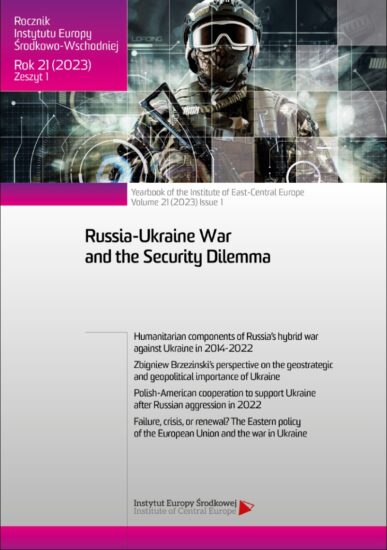The impact of political, military, and social factors on the repositioning of Belarus within the regional security architecture
The impact of political, military, and social factors on the repositioning of Belarus within the regional security architecture
Author(s): Justyna Olędzka, Taras PolovyiSubject(s): Government/Political systems, Geopolitics, Peace and Conflict Studies, Russian Aggression against Ukraine, Russian war against Ukraine
Published by: Instytut Europy Środkowej
Keywords: war between Russia and Ukraine; Belarus; the Union State; security of Central and Eastern Europe; Belarusian-Ukrainian relations; Belarusian-EU relations;
Summary/Abstract: The next phase of Russian aggression against Ukraine demonstrated that despite lacking a large military, territorial, population, or raw material potential, Belarus could play a significant role in the project to construct a new regional, continental, and even global security architecture. The purpose of this article is to discuss the problem of repositioning Belarus, which was af- fected not only by the multidimensional change in Belarusian-Ukrainian rela- tions as a result of the war but also by long-term efforts to elevate BelarusianEU relations. In this area, the fundamental research question is whether the war in Ukraine, the breach of the so-called Budapest Memorandum and the deepening of the multifaceted Russian-Belarusian integration within the Union State (including the militarisation of Belarus and the allocation of tactical nuclear weapons) will cause the projects for the redefinition of Belarus-EU relations (which are instrumental in reducing the intensity of political turbulence in the region) to disappear from the EU diplomatic agenda for a long time, with a direct negative impact on the future of European security. The article verifies the hypothesis that due to the specificity of the Belarusian authoritarian model, despite the systematically deepening Russian-Belarusian integration and the ever-expanding sanctions policy towards Belarus, (2) due to the shape of Belarusian-Ukrainian relations after 2014 and the periodically satisfactory Belarusian-EU relations, (1) there are still prospects for Belarus to pursue foreign policy diversification and repositioning of the European vector in it.
Journal: Rocznik Instytutu Europy Środkowo-Wschodniej
- Issue Year: 21/2023
- Issue No: 1
- Page Range: 185-207
- Page Count: 23
- Language: English

